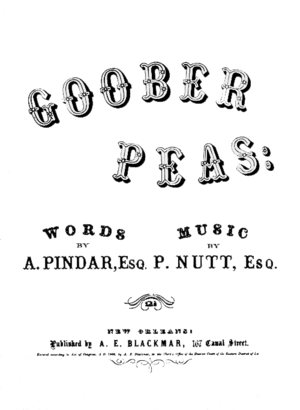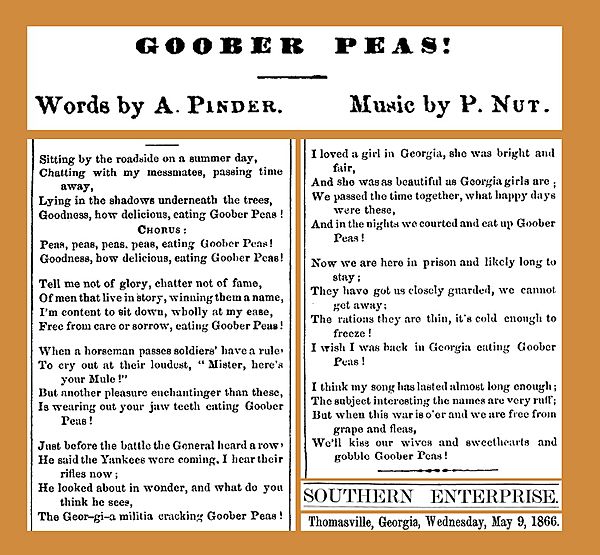Goober Peas facts for kids
Quick facts for kids "Goober Peas" |
|
|---|---|

Cover, sheet music, 1866
|
|
| Song | |
| Language | English |
| Published | 1866 |
| Composer(s) | P. Nutt |
| Lyricist(s) | A. Pindar |
"Goober Peas" is a traditional folk song. It probably started in the Southern United States. This song was very popular with Confederate soldiers. They sang it during the American Civil War. Even today, people still sing it often in the South. Many famous artists have recorded this song. These include Burl Ives, Tennessee Ernie Ford, and The Kingston Trio.
The words of "Goober Peas" describe daily life. They show what it was like for Southerners during the later part of the Civil War. Soldiers were often cut off from food supplies. They had little to eat besides boiled peanuts. These peanuts were also called "goober peas." They often served as emergency food. Peanuts were also known as "pindars" or "goobers."
The earliest sheet music for the song was published in 1866. It was released by A. E. Blackmar in New Orleans. Blackmar jokingly listed "A. Pindar" as the person who wrote the lyrics. He listed "P. Nutt" as the composer. These names are funny because "pindar" and "nut" are other words for peanuts.
Song Lyrics and Their Meaning
The lyrics of "Goober Peas" tell a story. They show what life was like for soldiers. The song talks about simple moments. It also mentions tough times during the war.
Verse 1
- Sitting by the roadside on a summer's day
- Chatting with my mess-mates, passing time away
- Lying in the shadows underneath the trees
- Goodness, how delicious, eating goober peas.
- Chorus
- Peas, peas, peas, peas
- Eating goober peas
- Goodness, how delicious,
- Eating goober peas.
Verse 2
- When a horse-man passes, the soldiers have a rule
- To cry out their loudest, "Mister, here's your mule!"
- But another custom, enchanting-er than these
- Is wearing out your grinders, eating goober peas.
- Chorus
This verse talks about soldiers' daily habits. They would joke with passing horsemen. But their favorite thing was eating peanuts. "Wearing out your grinders" means chewing a lot.
Verse 3
- Just before the battle, the General hears a row
- He says "The Yanks are coming, I hear their rifles now."
- He turns around in wonder, and what d'ya think he sees?
- The 15th Alabama, eating goober peas.
- Chorus
- (Note: There sat the 15th Alabama, is reported in contemporary accounts)
This verse shows a funny scene. A general thinks a battle is starting. But he finds his soldiers calmly eating peanuts. It highlights the soldiers' simple focus.
Verse 4
- I think my song has lasted almost long enough.
- The subject's interesting, but the rhymes are mighty tough.
- I wish the war was over, so free from rags and fleas
- We'd kiss our wives and sweethearts, and gobble goober peas.
- Chorus
The last verse expresses a wish for the war to end. Soldiers wanted to go home. They longed for comfort and their families. They also looked forward to eating "goober peas" in peace.
A Prison Version of the Song
The Reverend Wayland Fuller Dunaway was a captain in the Confederate army. He was captured during the war. He was held in a Union prison on Johnson's Island, Ohio. While there, he heard another verse of "Goober Peas." This verse describes the harsh conditions of prison life.
- But now we are in prison and likely long to stay,
- The Yankees they are guarding us, no hope to get away;
- Our rations they are scanty, 'tis cold enough to freeze,—
- I wish I was in Georgia, eating goober peas.
- Peas, peas, peas, peas,
- Eating goober peas;
- I wish I was in Georgia, eating goober peas.
-
- —Stanza of a Prison Song.
-
This verse shows the soldiers' longing for home. They missed the warmth of Georgia. They also missed having enough food.
"Goober Peas" in Pop Culture
The song "Goober Peas" has appeared in modern TV shows.
- In the TV show Veep, Season 3, Episode 3, called "Alicia," a character named Mike is made to sing "Goober Peas." This happens to prevent a story from being published.


